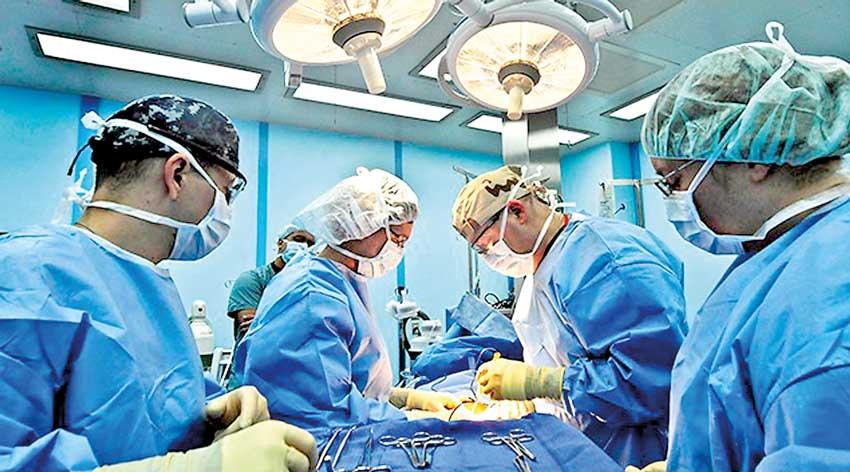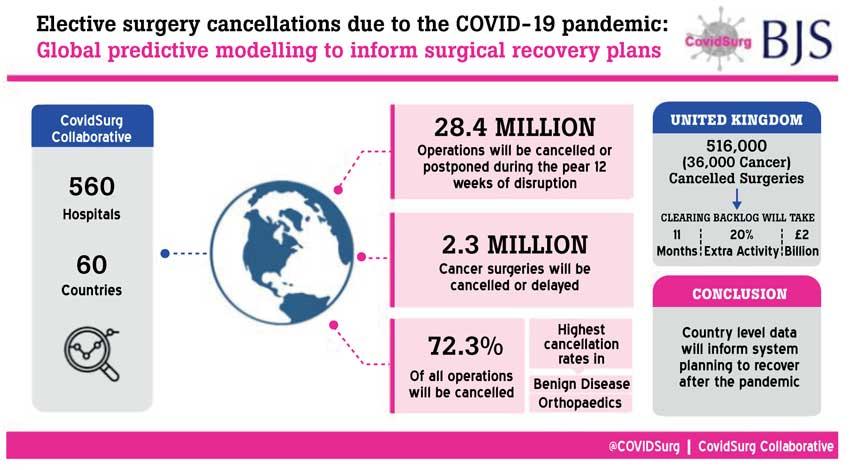Reply To:
Name - Reply Comment

 The Covid-19 pandemic is continuing to spread across the globe at a rate of knots whilst it’s burden on communities seems to be shooting-up despite the efforts in maximizing both protective and controlling gears like vaccination. With the towering daily counts of confirmed Covid cases, Sri Lankan health care sector is facing a prodigious crisis in utilizing resources efficiently to fulfill the expected requirement in managing Covid cases while keeping non-covid cases in check. To enlighten you on the topic of sustaining efforts regarding performing surgeries during this global pandemic we spoke to Dr Rifzan Jameel, Consultant General Surgeon, MBBS(Colombo) MD (Surgery) MRCS(Eng) FMAS (India), Teaching Hospital, Kurunegala.
The Covid-19 pandemic is continuing to spread across the globe at a rate of knots whilst it’s burden on communities seems to be shooting-up despite the efforts in maximizing both protective and controlling gears like vaccination. With the towering daily counts of confirmed Covid cases, Sri Lankan health care sector is facing a prodigious crisis in utilizing resources efficiently to fulfill the expected requirement in managing Covid cases while keeping non-covid cases in check. To enlighten you on the topic of sustaining efforts regarding performing surgeries during this global pandemic we spoke to Dr Rifzan Jameel, Consultant General Surgeon, MBBS(Colombo) MD (Surgery) MRCS(Eng) FMAS (India), Teaching Hospital, Kurunegala.
The Impact of Covid19 on global surgery
“Covid19 has resulted in unprecedented challenges to sustain global surgery efforts. ‘Cancel everything’ has trended as a hashtag ever since the beginning of the pandemic all for good reasons and the practice of surgery hasn’t been able to stay immune with the declaration of cancellation or postponement of all non-emergency surgical procedures in hospitals across the country. The aim of this is to lessen the risk of viral transmission, conserve critical resources including both staff and personal protective equipment (PPE) and increase hospital bed capacity in order to focus fully on the pandemic. But, how long are we going to function with this momentum?
“Should we really let health care facilities to get enshrouded by Covid19 and divulge the entire set-up towards it OR go-ahead with efficient treatment modalities for the affected, while maintaining an undisrupted normalcy.
Elective surgeries on hold
“Elective/routine surgery comes under interventions which don’t need any immediate action, where the patient has some time to try-out other treatment options. In fact, these surgeries are pre-planned on stable patients with no emergencies involved. Hernia repair, cholecystectomy are some of them” explains Dr Jameel.
According to CovidSurg Collaborative Research Study based on 12 weeks of peak disruption to hospital services due to Covid-19 has predicted that nearly 28 million elective surgeries across the globe have got cancelled or postponed due to Covid-19 pandemic-so this issue is definitely not something which is only limited to Sri Lanka.
“Mobilization of trained staff to manage covid-19 treatment units, limited ICU care available to manage non-covid post-operative patients, expenditure on carrying out mandatory antigen tests on patients awaiting surgery, limited access to protective equipment and rising concerns about safety have been identified as some of the major factors contributing to the afore-mentioned stumbling block.”
The struggle is real
“Pandemic-related postponement of elective surgery at this rate will create a substantial impact on the well-being of patients and potentially- devastating consequences on the entire health care system.
In fact, getting time-sensitive elective operations delayed can result in immobility, disability and deterioration of health thus reducing the overall quality of life of patients” highlights Dr Jameel.
This can also lead to,
Repeated hospital admissions due to recurring symptoms Conditions like Biliary colic due to gallstones and painful hernia with distressing symptoms can result in repeated hospital admissions with no satisfactory out-come, as the ultimate choice of treatment would be surgery.
Prolonged hospital stays
Conditions like Cholecystitis and pancreatitis in Gallstone disease can result in prolonged hospital stays as symptomatic management alone won’t resolve the underlying pathology.
Benign conditions can lead to life-threatening emergencies
Obstruction and strangulation of Hernia which could have easily been managed at early stages with minimal complications can be fatal and end up in requiring unnecessary emergency surgeries.
Back-log causing risen waiting-lists in time to come
The postponement of elective surgeries now can create ever- lengthening wait-lists in days to come when pre-covid hospital set-ups are restored. This would again result in a potential crisis-with a high demand exceeding the supply and many countries are already facing this issue during the post-pandemic era.

Moving forward is definitely about prioritization
“It is accepted that timely performance of elective surgeries is not much of a priority as the struggle is real in focusing on managing the pandemic with the limited amount of resources, available. But, it is equally important to reserve “blades and tables’ at least for a prioritized quota of deserving patients-who are hanging on a thread in terms of health.
Therefore, the government should work on revising policies to mitigate against this significant burden on patients, develop recovery plans and implement strategies to restore a well balanced and optimized surgical care while staying within the safe boundaries-as every life matters when it comes to a bottom line on choosing between life and death” concludes Dr Jameel.